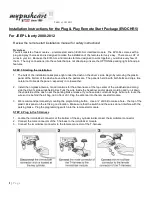
−
The treadwear grade is a compara-
tive rating based on the wear rate of
the tire when tested under controlled
conditions on a specified government
test course. For example, a tire
graded 150 would wear one and one-
half (1 1/2) times as well on the
government course as a tire graded
100. The relative performance of
tires depends upon the actual condi-
tions of their use, however, and may
depart significantly from the norm
due to variations in driving habits,
service practices and differences in
road characteristics and climate.
The traction grades, from highest to
lowest, are AA, A, B, and C. Those
grades represent the tire’s ability to
stop on wet pavement as measured
under controlled conditions on
specified government test surfaces
of asphalt and concrete. A tire
marked C may have poor traction
performance.
Warning: The traction grade
assigned to this tire is based on
straight-ahead braking traction tests,
and does not include acceleration,
cornering, hydroplaning, or peak
traction characteristics.
All passenger car tires must conform
to Federal Safety Requirements in
addition to these grades.
Quality grades can be found where
applicable on the tire sidewall
between the tread shoulder and the
maximum section width. For
example:
The tires on your car meet all U.S.
Federal Safety Requirements. All
tires are also graded for treadwear,
traction, and temperature perform-
ance according to Department of
Transportation (DOT) standards.
The following explains these
gradings.
Technical Inf ormation
Treadwear
Traction
AA, A, B, C
Treadwear 200
Traction AA
Temperature A
Unif orm Tire Quality Grading
DOT Tire Quality Grading (U.S. Cars)
367
















































